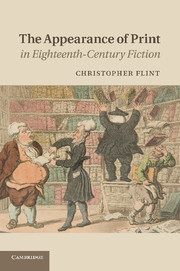Book contents
- Frontmatter
- Contents
- Figures
- Acknowledgments
- Introduction: Prose Fiction and Print Culture in Eighteenth-Century Britain
- Part One Author book reader
- Chapter 1 Pre-scripts: the contexts of literary production
- Chapter 2 Post scripts: the fate of the page in Charles Gildon’s epistolary fiction
- Part Two Reader book author
- Notes
- Bibliography
- Index
Chapter 2 - Post scripts: the fate of the page in Charles Gildon’s epistolary fiction
from Part One - Author book reader
Published online by Cambridge University Press: 07 September 2011
- Frontmatter
- Contents
- Figures
- Acknowledgments
- Introduction: Prose Fiction and Print Culture in Eighteenth-Century Britain
- Part One Author book reader
- Chapter 1 Pre-scripts: the contexts of literary production
- Chapter 2 Post scripts: the fate of the page in Charles Gildon’s epistolary fiction
- Part Two Reader book author
- Notes
- Bibliography
- Index
Summary
Caveat scriptor
Authors, for certain, are but a sorry Race.
(Shaftesbury, Soliloquy: or, Advice to an Author, 1710)Shaftesbury directed his Soliloquy at all authors, including himself, as his title cleverly suggests, but to most readers the term “sorry” probably evoked the “hackney writer,” a phrase derived from the belief that needy authors, like hackney coaches, were put up only for hire. Lacking originality, they recycled works by other authors in the form of cliché, paraphrase, imitation, and plagiarism. Never really owning their ideas, they nonetheless pretended to own up to them for personal gain or a middleman’s profit. Commonly associated with the “Grub Street” culture of the late seventeenth and early eighteenth centuries, they stood at the brink of what many historians consider the advent of the modern author – a professional writer who tactically denied his or her merely professional status.
- Type
- Chapter
- Information
- The Appearance of Print in Eighteenth-Century Fiction , pp. 61 - 102Publisher: Cambridge University PressPrint publication year: 2011



